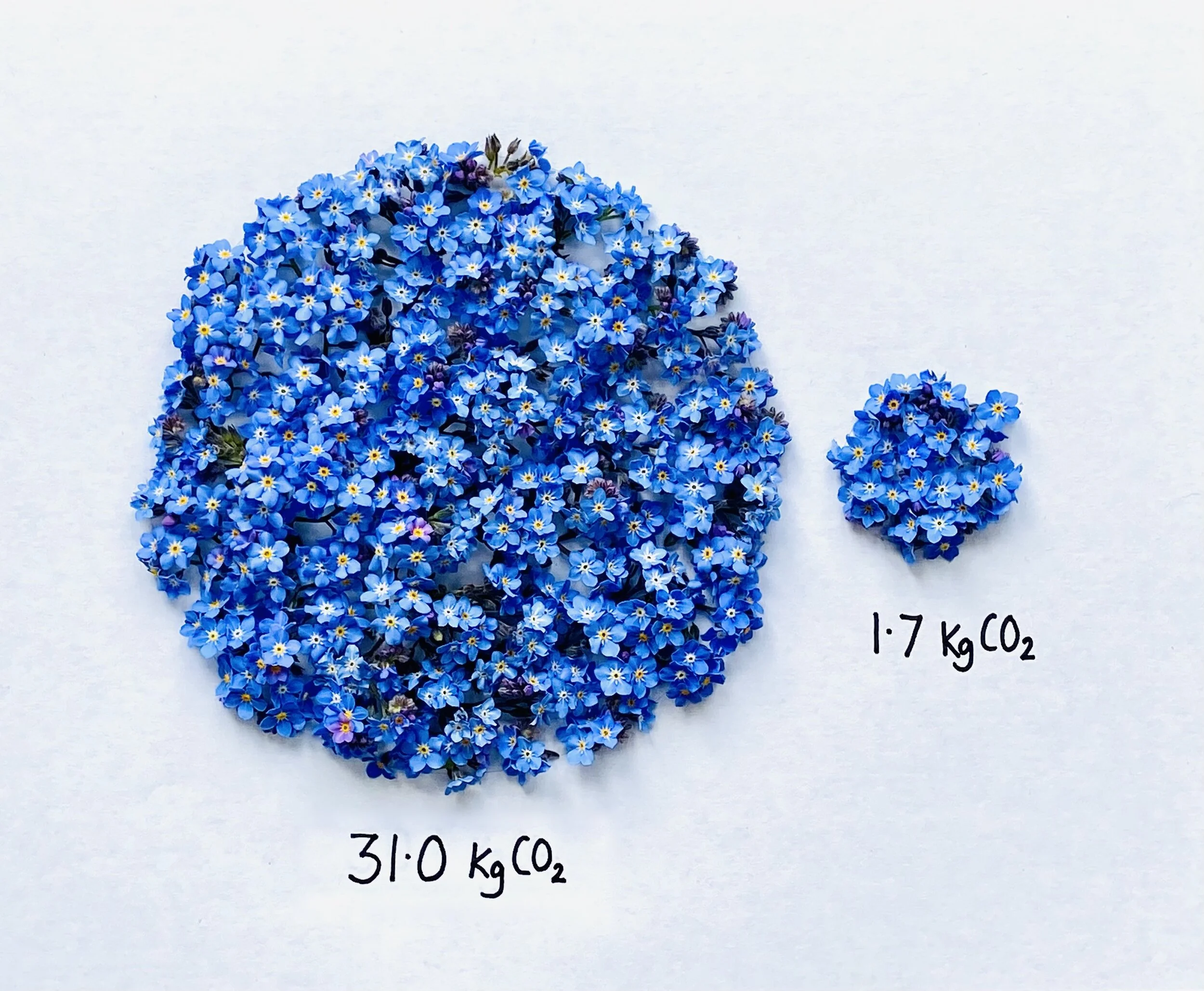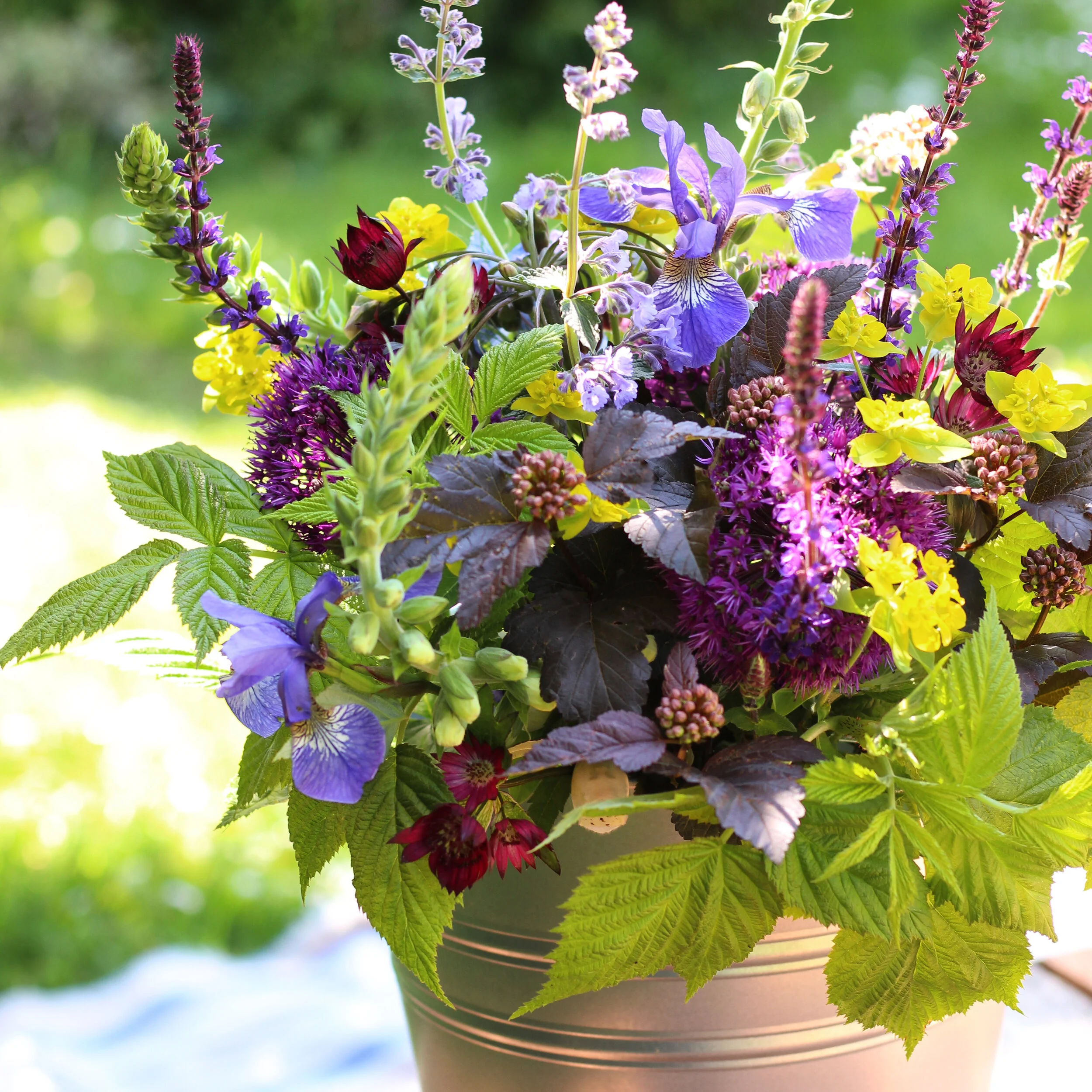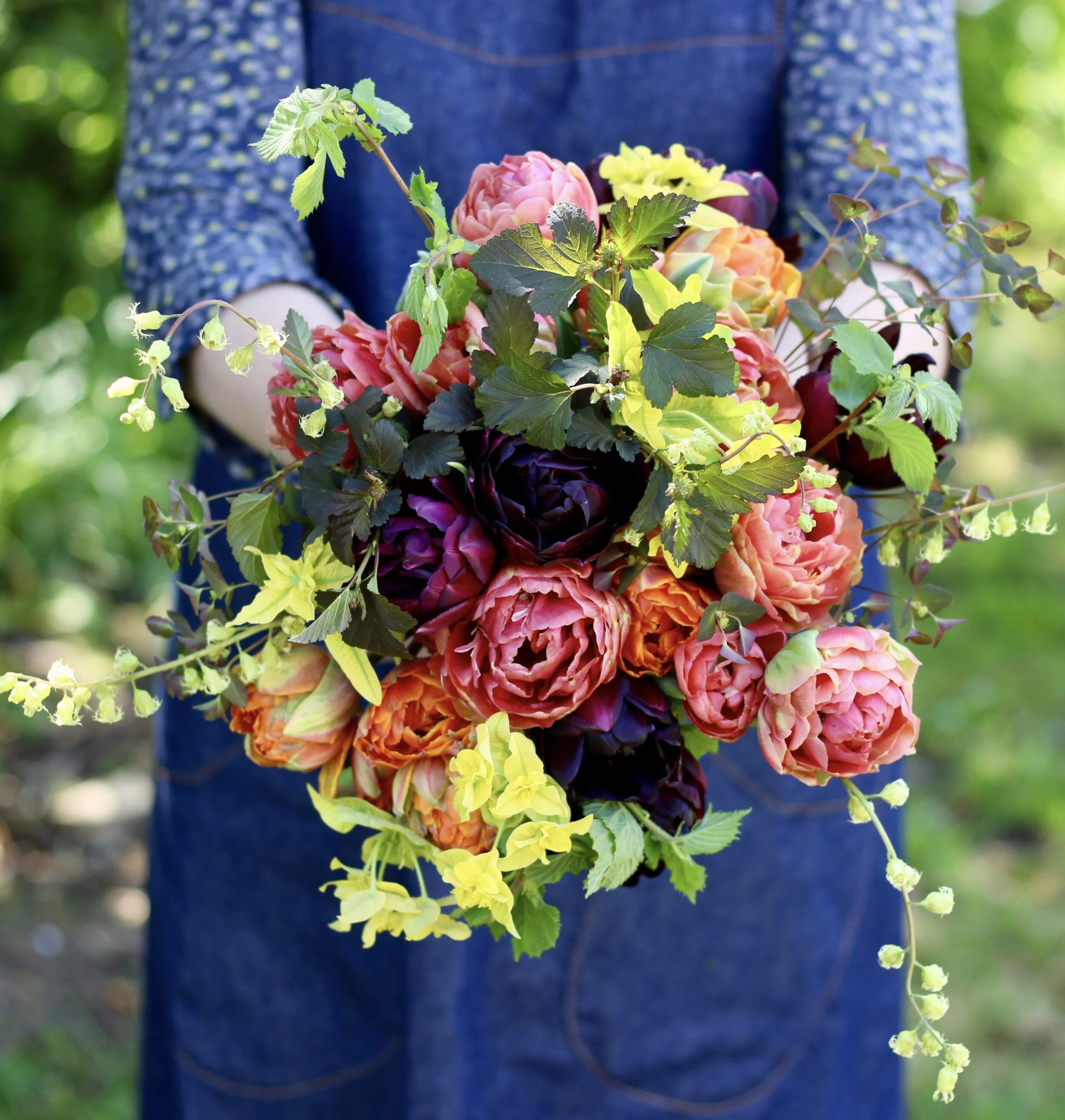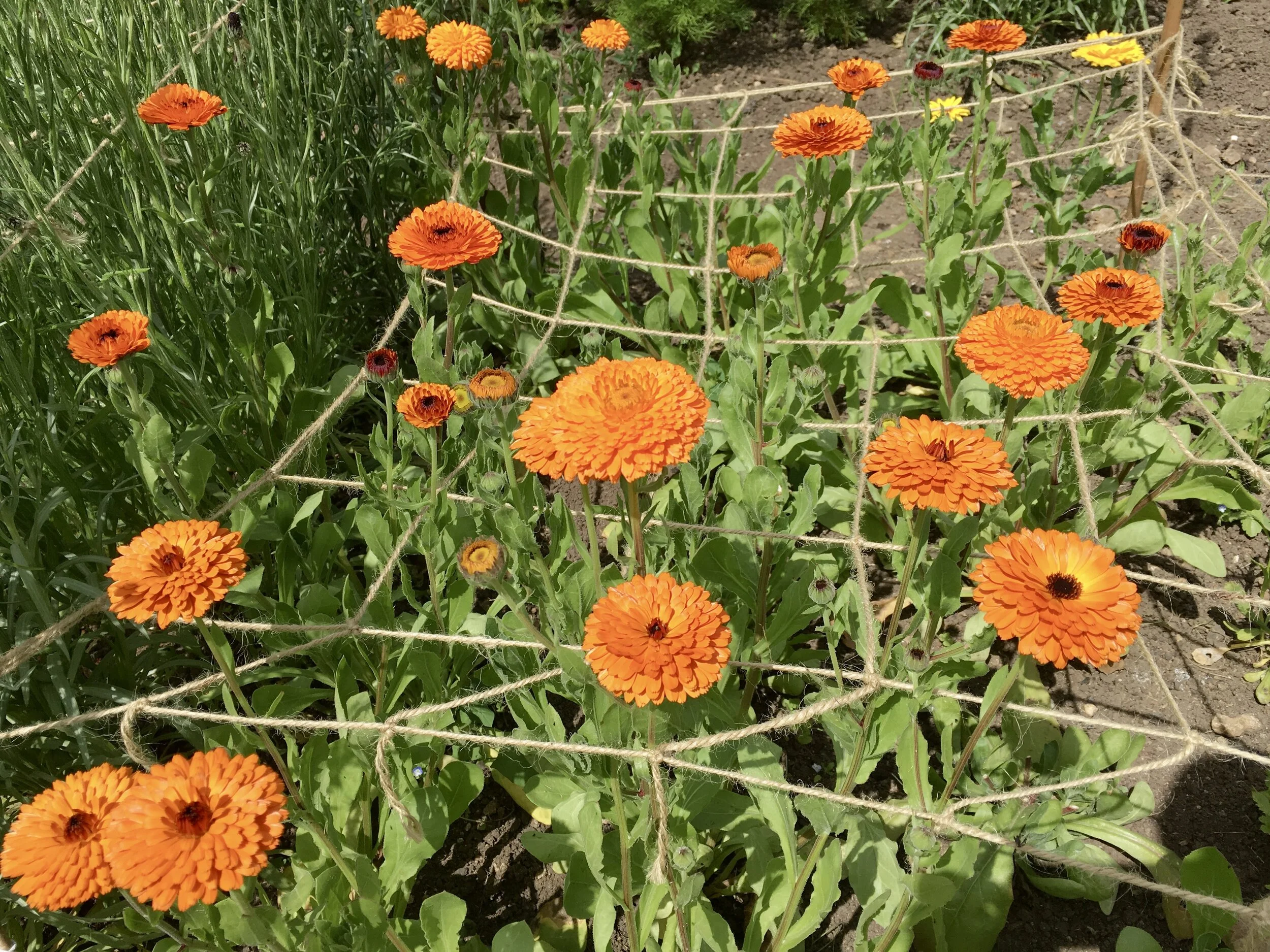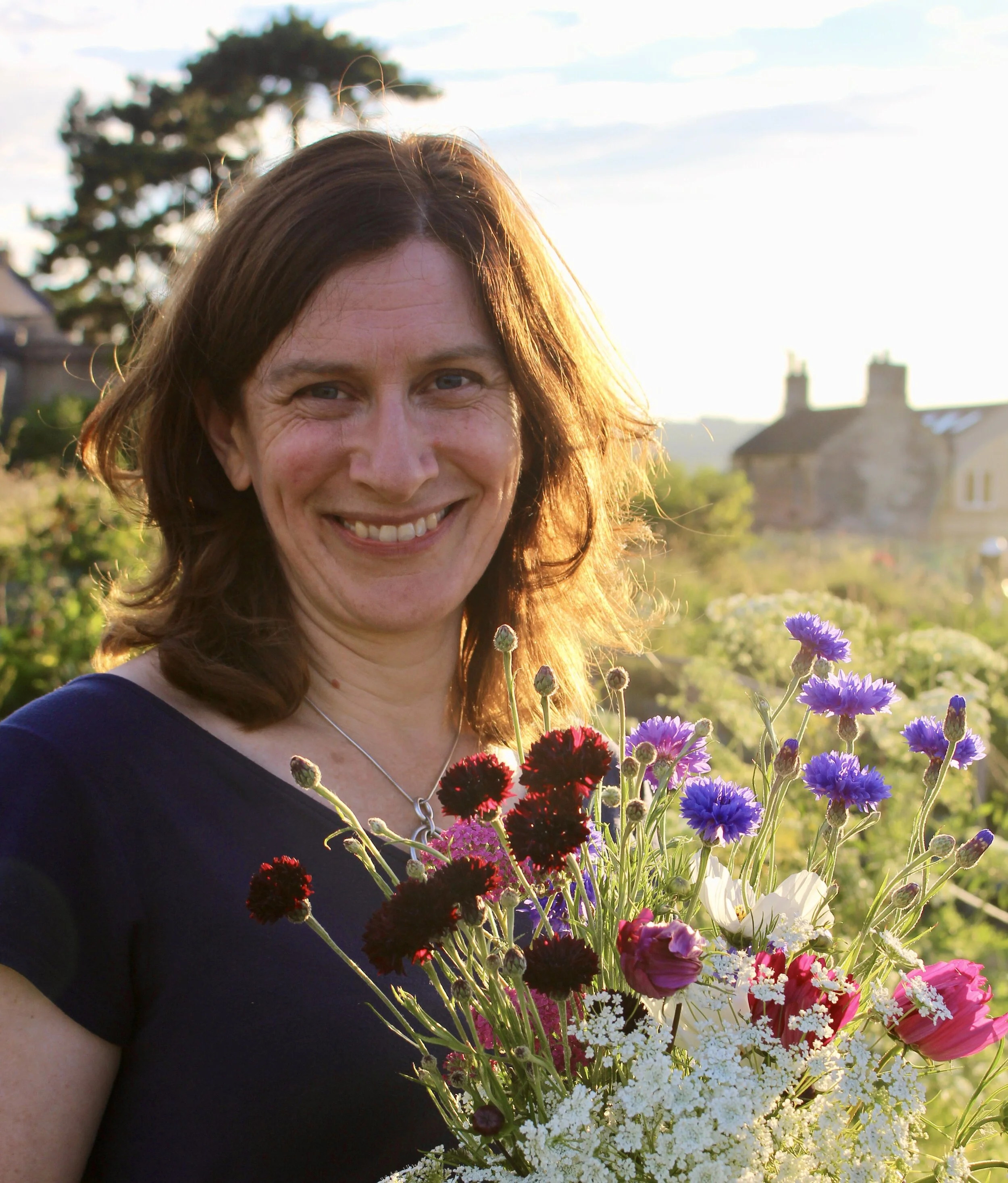Local resident Cathy Crozier-Cole talks about the benefits of locally grown ‘slow flowers’
Lots of us think about the food miles and carbon footprint of the food we eat, but have you ever wondered how much carbon is in a bunch of flowers?
The answer might surprise you. A recent study showed how a bouquet of Dutch lilies, Kenyan roses and gypsophila – the sort of bouquet you’d typically find in a supermarket – has a life cycle carbon impact of 31 kgCO2. That’s about the same as driving a petrol car from Bath to the outskirts of London. Emissions rack up due to a combination of fertilizer use, greenhouses with high and often inefficient heating and lighting systems, as well as refrigerated lorry and air transport. Consider that by comparison, emissions from an outdoor, locally grown bouquet of mixed garden flowers might be more like 1.7 kgCO2 – or just 5% of the imported one – and it might make you think again at the flower counter.
Comparison of embodied carbon emissions from a bouquet of Dutch lilies, Kenyan roses and gypsophila (left), compared to an outdoor, locally grown bouquet of garden flowers (right).
Source: https://www.flowersfromthefarm.co.uk/blog/the-carbon-footprint-of-flowers Image © Umbel
Through the ages, we’ve picked flowers as a reminder of the abundance of nature thriving just outside our homes. Yet in modern times, we’ve lost that connection, as flowers are hot housed in giant greenhouses and imported from far flung corners of the world. We’ve come to expect roses in February and tulips in August. It’s a topsy turvy world, in which flowers have lost their sense of time and place.
It hasn’t always been this way. As a child in the 1970s, I helped my Dad pack stocks and pinks for market at our flower nursery in Norfolk. At that time, the vast majority of flowers bought in the UK were grown here too. Small scale growers were common, and in fact the word ‘florist’ originally meant a flower grower who sold flowers at the garden gate. These days though, British grown flowers now account for just 15% of flowers bought in the UK, and high intensity flower imports have become the norm.
Yet there's a quiet revolution happening in the British flower growing industry. As demand for seasonal and local produce starts to rise, a growing movement of small-scale flower growers is championing the resurgence of locally grown, ‘slow flowers’ that emphasise minimal resource use and celebrate seasonality. Like their cousins ‘slow travel’ and ‘slow food’, ‘slow flowers’ offer an alternative approach to the sort of high intensity, globalised production that's become so much the norm in the cut flower world.
Local ‘slow flowers’ celebrate seasonality and offer delicate blooms not possible with imported flowers.
The positives of local flowers include beautiful fresh scent, and unusual and delicate varieties of flowers that don't tolerate long distance travel, so aren't often found on the high street. Embracing the seasonality of flowers – and enjoying what’s flowering naturally in our locality at any time – also offers us a closer connection to nature and a more mindful sense of place.
In 2020 I left my career of 20 years in sustainable energy to set up Umbel, a floristry business with a mission to offer ‘slow flowers’ that are as sustainable as possible. I deliver bouquets using flowers grown locally by me, and sometimes by other local flower growers when I need extra supply. My own flowers are grown using organic methods with no chemicals or pesticides, and seasonality and sustainability are at the heart of everything I do. Growing so close to Bath means I can deliver the freshest seasonal blooms to customers in the city with the fewest flower miles and in the quickest possible time. And this means I can provide varieties you wouldn’t find with imported flowers – cottage garden favourites and lacy umbellifers – which reflect all the wild and wispy romance of the meadow and hedgerow. For me, this is the true joy of local flowers.
A bouquet of Umbel’s outdoor raised flowers and foliage, all grown locally in Batheaston.
We’re lucky in Batheaston as there are lots of local growers, and a long history of market gardening in the village, so there is plenty to choose from if you feel like supporting local.
And if you like to grow your own, then there are plenty of ways to enjoy ‘slow flowers’ from your own garden too. Pretty much anything in your garden can be enjoyed as a cut flower (if you don’t believe me, then head out with a pair of secateurs and challenge to cut yourself 30 stems – you might be surprised at what you can find!). Lots of perennials are wonderful for cutting, as are foliage stems from shrubs and trees in your garden.
There’s just time to squeeze in a few annuals for cutting if you enjoy sowing from seed. Cosmos, nigella, calendula, cornflowers, ammi and zinnia are among my favourite ‘easy growers’ which can all be sown now and enjoyed in the vase in a few months’ time. You can succession sow to keep the stream of flowers coming, or plant late flowering plants like dahlias or sunflowers to keep your supply going into autumn. Some bulbs for spring, and winter foliage like box and holly, can keep you going pretty much all year round.
Calendulas are easy to grow from seed and make lovely cut flowers – these ones called ‘Indian Prince’ are my favourites.
Growing your own, and supporting local outdoor flower growers, is a great way to cut out the carbon, while still enjoying the seasonal magic that ‘a little bunch of the outdoors’ can bring into your home. Depending on how they’re grown, you can also be supporting biodiversity, pollinators, improved soil health, water efficiency, whilst also cutting out pesticide and fungicide use too.
Now that sounds like a gift that’s really worth giving.
Links:
· Umbel – www.umbel.co.uk (Instagram & Facebook @umbelflowers)
· Flowers From The Farm – www.flowersfromthefarm.co.uk (Instagram & Facebook @flowersfromthefarm) – membership association championing artisan growers of seasonal, scented, sustainable British cut flowers
Cathy set up Umbel in 2020 with a mission to offer sustainable ‘slow flowers’

